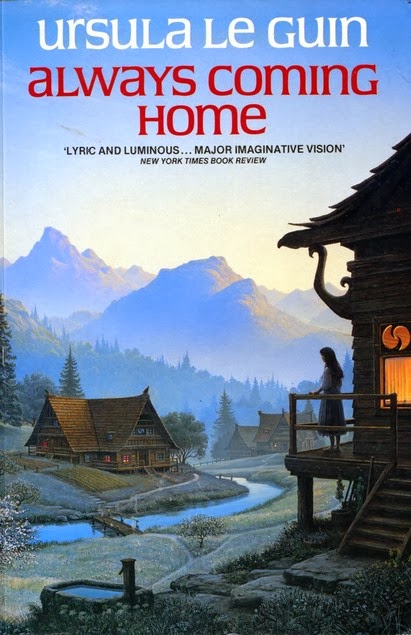


“he way one does research into nonexistent history is to tell the story and find out what happened. In the Foreword to Tales from Earthsea, she explained: With Le Guin, the door home is open, if you know the way. (For one, Le Guin pointed out you don’t have to read her book front to back approach it however you like.) Always Coming Home isn’t one of those masterworks that heaves through our culture like the spaceship Rama, to be explored but never understood by the puny humans who crawl across its unfeeling surface. But the one thing you couldn’t accuse it of is that classic combination of authorial self-indulgence and apathy towards the reader. Like many a masterwork that came before, the book is a storehouse of the author’s themes. Le Guin is another dense, late-career doorstop of a book considered in equal parts the summit of a life’s work and “one for the completists.” At 525 pages, including field notes, stories, maps, charts, poems, plays, histories, romances, interviews, and interpolated texts, all of which are housed in the front of the book, as well as a “Back of the Book” section, to house the sheet music, recipes, studies of flora and fauna, “generative metaphors,” the glossary, and a made-up alphabet with a guide to pronunciation, it’s easy to see Le Guin’s study of the Kesh people from the Valley of the Na, once the Napa Valley, as a folly, the work in which she gave into the temptation of all science fiction and fantasy writers-that of pedantic world-building, a sort of “map = territory” madness.

Samuel R Delaney has Dhalgren, Vladimir Nabokov had Ada, or Ardor, and James Joyce had Finnegans Wake, or simply “the Wake,” as the true fans prefer. Tao Te Ching, Lao Tzu, as interpreted by Ursula K. But they get old and die without ever having been there. The next little country might be so close people could hear cocks crowing and dogs barking there. They’d enjoy eating, take pleasure in clothes, be happy with their houses, devoted to their customs. Instead of writing they might go back to using knotted cords.

They’d have armor and weapons but no parades. They’d have ships and carriages but no place to go. Let them be mindful of death and disinclined to long journeys. Let them have tools that do the work of ten or hundred and never use them. Let there be a little country without many people.


 0 kommentar(er)
0 kommentar(er)
